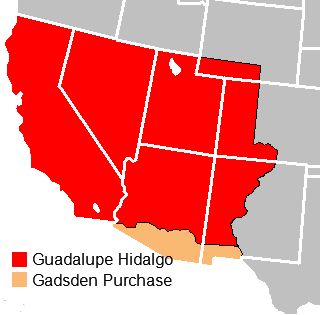More languages
More actions
(Annexation) Tag: Visual edit |
m (Categories) Tag: Visual edit |
||
| Line 22: | Line 22: | ||
== References == | == References == | ||
<references /> | |||
[[Category:Wars]] | |||
[[Category:History of the USA]] | |||
Revision as of 16:29, 14 July 2023

The Mexican–Statesian War was a U.S. war of aggression against Mexico that lasted from 1846 to 1848. It ended when the USA annexed 525,000 square miles of land in what is now Arizona, Colorado, Nevada, Utah, and parts of Colorado, New Mexico, and Wyoming. In 1853, the USA bought more territory in Arizona and New Mexico with the Gadsden Purchase.[1]
Background
After the Mexican government banned slavery in 1829, US-backed settlers in Texas rebelled to form the Republic of Texas in 1836.[2] By the time the United States annexed it in 1845, there were tens of thousands of settlers there.
In 1846, President James K. Polk ordered Zachary Taylor to deploy 4,000 troops to the Rio Grande and sent the Navy to California and told it to invade Yerba Buena (now San Francisco) in the event of war.[1]
Invasion
After Polk falsely claimed that Mexican troops had attacked U.S. troops on U.S. territory, troops marched from Fort Leavenworth to Santa Fe and occupied New Mexico, where the ruling class sided with the USA. Stephens Watts Kearny, promoted from colonel to general, marched to the Pacific and occupied San Diego and Los Angeles. The USA then captured Veracruz, Puebla, and Mexico City, occupying the capital from September 1847 to June 1848.[1]
Indigenous resistance
After the annexation, U.S. cavalry troops attacked the Apaches led by Mangas Coloradas, destroying crops and villages and murdering civilians.[2]
Treaty of Guadalupe Hidalgo
In 1848, the USA signed the Treaty of Guadalupe Hidalgo and agreed to leave southern Mexico in exchange for the USA annexing the northern part of Mexico, which was almost half of Mexico's prewar territory. The USA paid $15 million to Mexico in addition to $3.25 million of debt. Polk also planned to invade the Yucatán and buy Cuba from Spain, and some Democrats wanted to annex all of Mexico.[1]
Opposition
Former president John Quincy Adams and future president Abraham Lincoln both opposed the war in Congress. Henry David Thoreau was imprisoned for refusing to pay poll taxes that would fund the war and wrote the essay "Civil Disobedience."
Because of the anti-Catholicism of the Army, several hundred Irish soldiers switched sides and joined the San Patricio Battalion to defend Mexico.[1]
References
- ↑ 1.0 1.1 1.2 1.3 1.4 David Vine (2020). The United States of War: 'The Permanent Indian Frontier' (pp. 149–54). Oakland: University of California Press. ISBN 9780520972070 [LG]
- ↑ 2.0 2.1 Roxanne Dunbar-Ortiz (2014). An Indigenous Peoples' History of the United States: 'Sea to Shining Sea' (pp. 123–132). ReVisioning American History. [PDF] Boston: Beacon Press Books.
